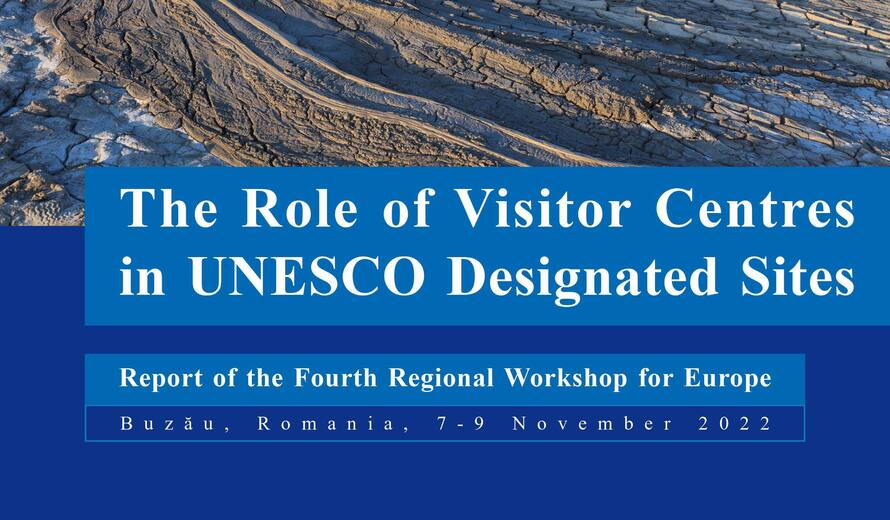Enabling Visitor Centres to promote Sustainable Tourism in UNESCO Designated Sites: New Report on Regional Experiences
The final report of the 4th regional workshop on the Role of Visitor Centres in UNESCO Designated Sites has been released online. It provides insight from participants on fostering tourism sustainability and effective visitor management. The workshop, held in Buzau in November, brought together managers from 22 UNESCO sites across 16 European countries, offering a platform to exchange valuable experiences and perspectives.
UNESCO designated sites, including World Heritage properties, Biosphere Reserves and UNESCO Global Geoparks, attract a diverse range of visitors and hold the potential to support various ecologically and socially sustainable uses, such as tourism, which can significantly contribute to local development.
In the wake of the COVID-19 pandemic, many destinations in Europe have seen a strong rebound in tourism arrivals and spending, resulting in the recovery approaching its pre-COVID level, while important economic, social, and environmental challenges and risks remain ahead.
Against this backdrop, UNESCO through its Regional Bureau for Science and Culture in Europe convened the 4th regional workshop on the Role of Visitor Centres in UNESCO Designated Sites, specially addressing tourism sustainability and visitor management. Held in Buzau, Romania, on 7-9 November 2022, the event was hosted by the Buzau County Council in collaboration with the Buzau Land UNESCO Global Geopark, the University of Bucharest, the Hațeg County UNESCO Global Geopark, and the National Commission of Romania for UNESCO.
The workshop called on UNESCO designated sites to re-evaluate their tourism strategies and models as destinations, enhance their capacities to manage visitor flows, influence visitor behaviour, and develop meaningful and beneficial experiences for both tourists and local communities through visitor/information centres.
Drawing on extensive discussions during the meeting and complementary research, the report sheds light on the most pressing concerns faced by managers of UNESCO designated sites in Europe regarding the sustainable management and utilisation of their cultural and natural resources. The report underlines what sustainable tourism means in the context of UNESCO designated sites and accordingly, how to achieve the relevant goals by implementing better visitor facilities and services.
Through a range of compelling case studies shared by participants, the report demonstrates emerging trends in visitor management, in particular the growing use of information technology and data, as well as the challenges posed by new circumstances.
I believe this report, which summarises and systematises the rich information and experiences exchanged during the meeting, lays the foundation for further regional cooperation on the management of UNESCO designated sites, notably visitor centres, for sustainable tourism.
The report highlights the potential of visitor centres in UNESCO designated sites to foster sustainable tourism. Acting as interfaces between designated territories, visitors, communities, site managing systems and other partners, visitor centres can facilitate the active participation of multiple local stakeholders in formulating and refining a consistent communication and promotion strategy for the destination, besides providing specialised services to increase the access to local, cultural and natural assets.
Visitor centres can serve as vital hubs for collecting and utilising visitor data to improve the management of visitor flows. By collaborating with relevant actors, visitor centres can, in turn, leverage the data to transversally enhance their partners' work and businesses (for example, the academies, local industries, and local public authorities).
Visitor centres can also play a crucial role in creating a meaningful site experience through participatory, values-driven heritage interpretation. These centres may help visitors to extend their mindful experiences and valuable learnings to their own contexts, fostering responsible behaviours throughout their life.
Respondents provided meaningful feedback to the anonymous post-workshop survey:
“We need to work more and create networks of UNESCO sites and people involved with site management and thus find a common voice for more efficient communication with visitors, authorities and media.”
“The biggest takeaway for me was the insights into the use of visitor data, reviews and the rewards for tourists for sending feedback.”
“It is vital to offer visitors a deeper experience through heritage interpretation, to educate them about the importance of heritage, and to monitor the impact of tourism on the destination and the local communities.”
Visitor centres can finally broaden and deepen cooperation among diverse partners, aiming for stronger synergies in sustainable destination development. Adequate collaboration among public, private and civil society actors is essential for the sustainability of visitor centres and the associated sites, both financially and operationally.
The organisation of this series of regional workshops on the Role of Visitor Centres in UNESCO Designated Sites, launched in 2018, and the production of reports are part of the intersectoral programme of work at the UNESCO Regional Bureau for Science and Culture in Europe. The activity is made possible thanks to the annual contribution of Italy to the UNESCO Regional Bureau.
